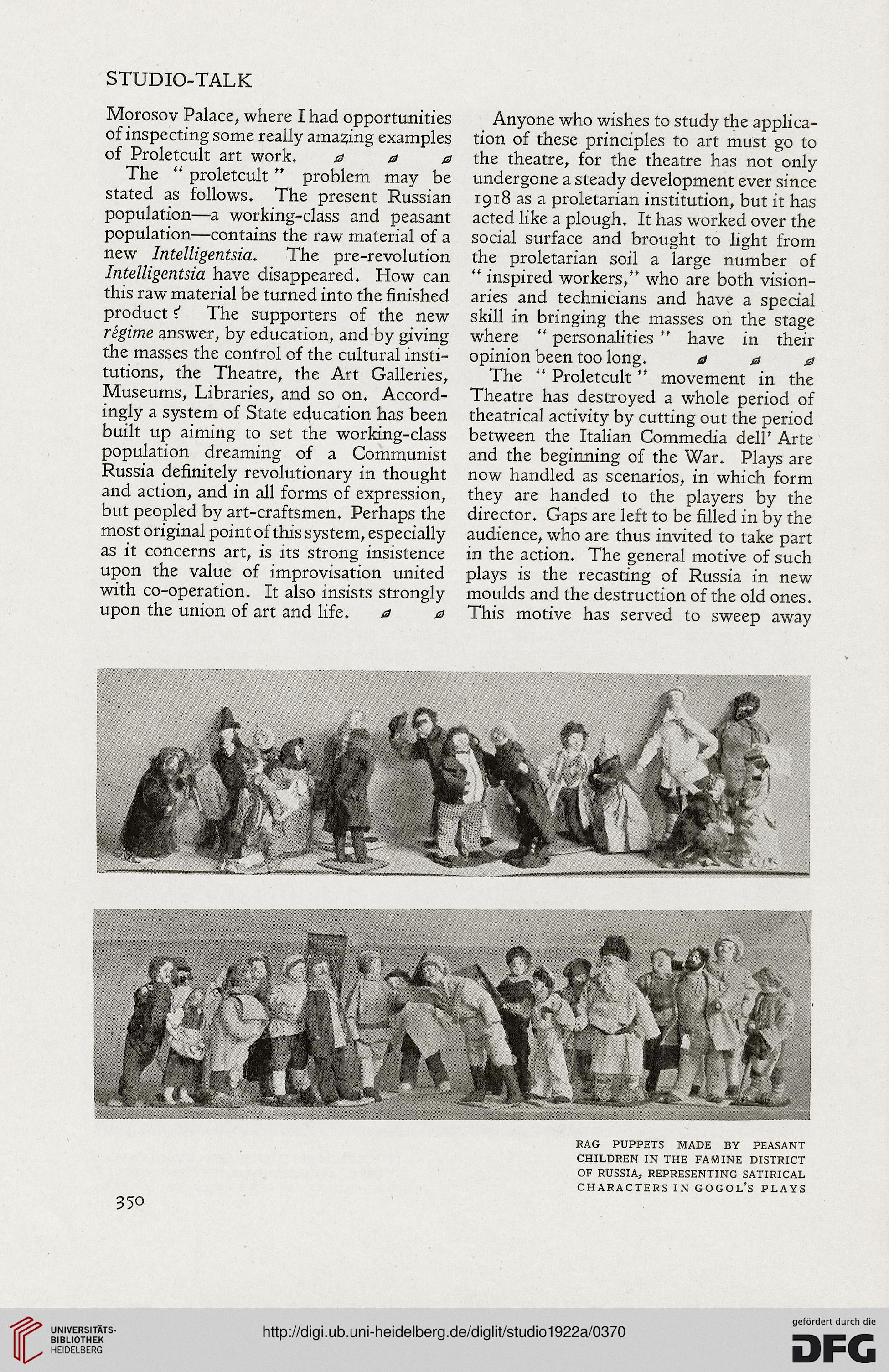STUDIO-TALK
Morosov Palace, where I had opportunities Anyone who wishes to study the applica-
of inspecting some really amazing examples tion of these principles to art must go to
of Proletcult art work. a a a the theatre, for the theatre has not only
The "proletcult" problem may be undergone a steady development ever since
stated as follows. The present Russian 1918 as a proletarian institution, but it has
population—a working-class and peasant acted like a plough. It has worked over the
population—contains the raw material of a social surface and brought to light from
new Intelligentsia. The pre-revolution the proletarian soil a large number of
Intelligentsia have disappeared. How can " inspired workers," who are both vision-
this raw material be turned into the finished aries and technicians and have a special
product i The supporters of the new skill in bringing the masses on the stage
regime answer, by education, and by giving where " personalities " have in their
the masses the control of the cultural insti- opinion been too long. a a a
tutions, the Theatre, the Art Galleries, The " Proletcult " movement in the
Museums, Libraries, and so on. Accord- Theatre has destroyed a whole period of
ingly a system of State education has been theatrical activity by cutting out the period
built up aiming to set the working-class between the Italian Commedia dell' Arte
population dreaming of a Communist and the beginning of the War. Plays are
Russia definitely revolutionary in thought now handled as scenarios, in which form
and action, and in all forms of expression, they are handed to the players by the
but peopled by art-craftsmen. Perhaps the director. Gaps are left to be filled in by the
most original point of this system, especially audience, who are thus invited to take part
as it concerns art, is its strong insistence in the action. The general motive of such
upon the value of improvisation united plays is the recasting of Russia in new
with co-operation. It also insists strongly moulds and the destruction of the old ones,
upon the union of art and life. a 0 This motive has served to sweep away
RAG PUPPETS MADE BY PEASANT
CHILDREN IN THE FAMINE DISTRICT
OF RUSSIA, REPRESENTING SATIRICAL
CHARACTERS IN GOGOL'S PLAYS
350
Morosov Palace, where I had opportunities Anyone who wishes to study the applica-
of inspecting some really amazing examples tion of these principles to art must go to
of Proletcult art work. a a a the theatre, for the theatre has not only
The "proletcult" problem may be undergone a steady development ever since
stated as follows. The present Russian 1918 as a proletarian institution, but it has
population—a working-class and peasant acted like a plough. It has worked over the
population—contains the raw material of a social surface and brought to light from
new Intelligentsia. The pre-revolution the proletarian soil a large number of
Intelligentsia have disappeared. How can " inspired workers," who are both vision-
this raw material be turned into the finished aries and technicians and have a special
product i The supporters of the new skill in bringing the masses on the stage
regime answer, by education, and by giving where " personalities " have in their
the masses the control of the cultural insti- opinion been too long. a a a
tutions, the Theatre, the Art Galleries, The " Proletcult " movement in the
Museums, Libraries, and so on. Accord- Theatre has destroyed a whole period of
ingly a system of State education has been theatrical activity by cutting out the period
built up aiming to set the working-class between the Italian Commedia dell' Arte
population dreaming of a Communist and the beginning of the War. Plays are
Russia definitely revolutionary in thought now handled as scenarios, in which form
and action, and in all forms of expression, they are handed to the players by the
but peopled by art-craftsmen. Perhaps the director. Gaps are left to be filled in by the
most original point of this system, especially audience, who are thus invited to take part
as it concerns art, is its strong insistence in the action. The general motive of such
upon the value of improvisation united plays is the recasting of Russia in new
with co-operation. It also insists strongly moulds and the destruction of the old ones,
upon the union of art and life. a 0 This motive has served to sweep away
RAG PUPPETS MADE BY PEASANT
CHILDREN IN THE FAMINE DISTRICT
OF RUSSIA, REPRESENTING SATIRICAL
CHARACTERS IN GOGOL'S PLAYS
350




